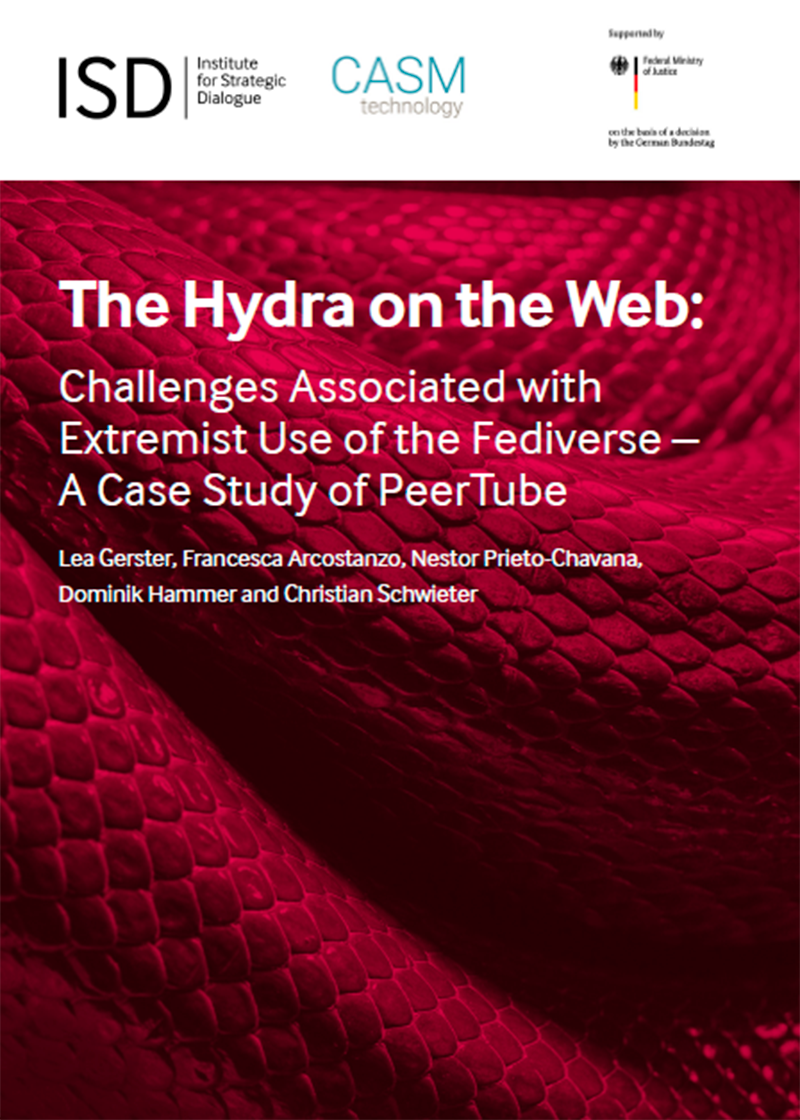The Hydra on the Web: Challenges Associated with Extremist Use of the Fediverse – A Case Study of PeerTube

Authors: Lea Gerster, Francesca Arcostanzo, Nestor Prieto-Chavana,
Dominik Hammer and Christian Schwieter
Published: 12 May 2023
This is a translation of a report first published in German on 19 December 2022 under the title “Die Hydra im Netz: Herausforderung der extremistischen Nutzung des Fediverse am Beispiel PeerTube“.
In this report we take a closer look at the free software PeerTube and its use by right-wing extremist and conspiracy ideological milieus in the German-speaking world. The relevance of PeerTube first became clear through completed analyses during our investigation “Telegram as a buttress“. At that time, the ITS research team came across several video platforms that had almost identical layouts and functions. It turned out that eight of 19 identified video platforms were created using the free software PeerTube.
With this software, individuals and groups whose content has been blocked by established social networks have a back up option, having the possibility of creating their own video archives and platforms using PeerTube. Since PeerTube is a decentralised network of separately managed servers, no one has authority over all content on any network. Only the operators of the respective individual servers (called “instances”) can moderate the content there. Since PeerTube is a free software, its use by right-wing extremists cannot be banned.
PeerTube belongs to the Fediverse, a collection of programs that can be used to create one’s own social networks. Thanks to a common network protocol, instances, even those set up through different software, can communicate with each other. Because of the federation system, content can spread beyond its hosting instance. This poses risks of anti-constitutional or otherwise dangerous content spreading beyond individual instance.
We identified 34 PeerTube instances that recurred in the conspiracy ideology to right-wing extremist scene. ISD conducted analyses on their network as well as their usage patterns. The central findings are as follows:
- Instances run by right-wing extremist and conspiracy ideological groups connect mainly to each other, but also connect to the wider Fediverse through some highly networked servers.
- A content analysis revealed that the COVID-19 pandemic was discussed particularly frequently on the instances studied. Other common topics included conspiracies by sinister elites who allegedly seek world domination through orchestrated crises.
- Right-wing extremists and conspiracy ideologues cannot generate the same click numbers as on platforms like YouTube. However, PeerTube offers a valuable method for safeguarding extremist content, as videos and channels are completely under the control of the server admin.
- The individuals and groups observed use PeerTube in different ways. While some build their own social network where third parties can register and upload their own videos, others create video archives or some kind of streaming service where only selected individuals are allowed to publish their content. These different structures have correspondingly different implications for the possible regulation of such content.
Due to the decentralised structure of PeerTube, extremist content can only be countered by state regulation and to a limited extent. However, this challenge also offers new opportunities for self-regulation by the PeerTube community. The isolation of the “alt-tech” platform Gab by the Fediverse community showed ways in which self-regulatory measures can reduce the reach of extremist material. One possibility would be for civil society to support the PeerTube community in identifying and isolating extremist content, for example, through training, and thus develop best practices together with the Fediverse community to address extremist use of Fediverse.
